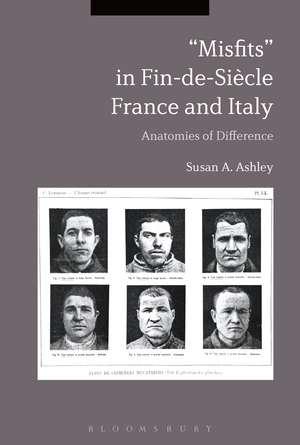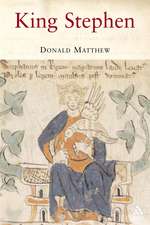"Misfits" in Fin-de-Siècle France and Italy: Anatomies of Difference
Autor Susan A. Ashleyen Limba Engleză Hardback – 3 mai 2017
| Toate formatele și edițiile | Preț | Express |
|---|---|---|
| Paperback (1) | 239.32 lei 6-8 săpt. | |
| Bloomsbury Publishing – 28 noi 2018 | 239.32 lei 6-8 săpt. | |
| Hardback (1) | 775.02 lei 6-8 săpt. | |
| Bloomsbury Publishing – 3 mai 2017 | 775.02 lei 6-8 săpt. |
Preț: 775.02 lei
Preț vechi: 1113.63 lei
-30% Nou
Puncte Express: 1163
Preț estimativ în valută:
148.31€ • 153.97$ • 123.67£
148.31€ • 153.97$ • 123.67£
Carte tipărită la comandă
Livrare economică 22 martie-05 aprilie
Preluare comenzi: 021 569.72.76
Specificații
ISBN-13: 9781350013391
ISBN-10: 1350013390
Pagini: 312
Dimensiuni: 156 x 234 x 21 mm
Greutate: 0.59 kg
Editura: Bloomsbury Publishing
Colecția Bloomsbury Academic
Locul publicării:London, United Kingdom
ISBN-10: 1350013390
Pagini: 312
Dimensiuni: 156 x 234 x 21 mm
Greutate: 0.59 kg
Editura: Bloomsbury Publishing
Colecția Bloomsbury Academic
Locul publicării:London, United Kingdom
Caracteristici
Investigates the prominent fin-de-siècle biological defect theory pertaining to deviant or abnormal behaviour and the solutions it prompted
Notă biografică
Susan A. Ashley is Professor of History at Colorado College, USA. She is the author of Making Liberalism Work: The Italian Experience, 1860-1914 (2003).
Cuprins
1. In Spite of Evolution, Because of Modern LifePart I - Mental Misfits2. Geniuses3. Lunatics4. NeuroticsPart II - Social Misfits5. Vagabonds6. Criminals7. Sexual Deviants8. Singular AnalogiesBibliographyIndex
Recenzii
Ashley's study offers a detailed and nuanced account of diverse understandings of deviance.
Ideengeschichte (the history of ideas), when done well (unarguably the case here), provides a clear and sympathetic understanding of the diachronic development of an idea, fully exploring the intellectual and social matrix informing that development. Here, the author focuses on the view of "misfits" as understood by criminologists, psychiatrists, neurologists, sociologists, anthropologists, physiologists, forensic doctors, and jurists in fin-de-siècle France and Italy. In their writings and lectures (based on clinical observations, case studies, anthropometrics, and statistics), intellectuals strove to understand the causes and symptoms of their society's geniuses, lunatics, neurotics, vagabonds, criminals, and sexual deviants. Sharp disagreements ensued as the data, organized in ever more refined classificatory "anatomies of difference," raised questions of causality (congenital/acquired, biological/social), occurrence (occasional/habitual), transmissibility, and degeneracy (individual/societal). But Ashley (Colorado College) also identifies the commonalities among the thinkers with respect to their empiricism, the privileging of heredity (whether Lamarckian or Darwinian), a focus on epilepsy (the "quintessential degenerative disorder"), accepting the inherence of energy in matter (nervous system), a disdain for the metaphysical suppositions and vocabulary of classical jurisprudence, and a conviction that their research was both timely and important for their colleagues in law, public policy, and government. Summing Up: Recommended. All academic levels/libraries.
Susan A. Ashley refreshes this well-trodden ground with a broad scope and transnational and comparative approach ... Remarkably rich, dense and detailed.
[This book] will be useful to scholars of the social, cultural, and intellectual history of the fin de siècle . Misfits helps us understand the anxieties about civilization, whom it was leaving behind, and whom it was harming.
Ashley's style remains readable and clear ... The chapter on neurasthenia is one of the best in the book.
By focusing on how professionals in fin-du-siecle France and Italy interpreted vagrancy, crime, sexual perversion, madness, as well as genius and lunacy - all that inform the category of "misfits" - Susan Ashley illuminates how the assumptions, systems of thought, motives, and prejudices of criminologists, sociologists, and medical practitioners responded to the uncertainties of modernity. Gently contesting Michel Foucault's assault on disciplinary reason, Ashley provides a discerning blend of intellectual and cultural history. Her careful examination of the shift of analytical categories during this era naturally leads a reader to ponder current analyses of so-called "misfits" and how societies should respond.
Misfits is the perfect title to Susan Ashley's fascinating book. It describes the fin-de-siècle anxieties of intellectual geniuses and aesthetes who worried about their sanity and loss of moral bearing, as well as to the broader array of "degenerates," criminals and "perverts," who threatened bourgeois self-confidence during the Belle Époque. It also speaks to the failure of criminal anthropologists, psychiatrists, medical experts and social theorists to concur on the etiology of such a "plague of misfits" or its supposed effects upon society. Misfits is indispensable for scholars of nineteenth-century criminality, madness and sexuality.
Could democratic and scientific progress encourage the rise of social exclusion? Examining French and Italian societies at the fin-de-siècle, as well as a century of historiographical debates, Susan Ashley provides very rich materials to understand how politics and culture build an underclass made of vagrants, criminals, lunatics, sexual deviants, and others. A relevant study of what deviance is.
Ideengeschichte (the history of ideas), when done well (unarguably the case here), provides a clear and sympathetic understanding of the diachronic development of an idea, fully exploring the intellectual and social matrix informing that development. Here, the author focuses on the view of "misfits" as understood by criminologists, psychiatrists, neurologists, sociologists, anthropologists, physiologists, forensic doctors, and jurists in fin-de-siècle France and Italy. In their writings and lectures (based on clinical observations, case studies, anthropometrics, and statistics), intellectuals strove to understand the causes and symptoms of their society's geniuses, lunatics, neurotics, vagabonds, criminals, and sexual deviants. Sharp disagreements ensued as the data, organized in ever more refined classificatory "anatomies of difference," raised questions of causality (congenital/acquired, biological/social), occurrence (occasional/habitual), transmissibility, and degeneracy (individual/societal). But Ashley (Colorado College) also identifies the commonalities among the thinkers with respect to their empiricism, the privileging of heredity (whether Lamarckian or Darwinian), a focus on epilepsy (the "quintessential degenerative disorder"), accepting the inherence of energy in matter (nervous system), a disdain for the metaphysical suppositions and vocabulary of classical jurisprudence, and a conviction that their research was both timely and important for their colleagues in law, public policy, and government. Summing Up: Recommended. All academic levels/libraries.
Susan A. Ashley refreshes this well-trodden ground with a broad scope and transnational and comparative approach ... Remarkably rich, dense and detailed.
[This book] will be useful to scholars of the social, cultural, and intellectual history of the fin de siècle . Misfits helps us understand the anxieties about civilization, whom it was leaving behind, and whom it was harming.
Ashley's style remains readable and clear ... The chapter on neurasthenia is one of the best in the book.
By focusing on how professionals in fin-du-siecle France and Italy interpreted vagrancy, crime, sexual perversion, madness, as well as genius and lunacy - all that inform the category of "misfits" - Susan Ashley illuminates how the assumptions, systems of thought, motives, and prejudices of criminologists, sociologists, and medical practitioners responded to the uncertainties of modernity. Gently contesting Michel Foucault's assault on disciplinary reason, Ashley provides a discerning blend of intellectual and cultural history. Her careful examination of the shift of analytical categories during this era naturally leads a reader to ponder current analyses of so-called "misfits" and how societies should respond.
Misfits is the perfect title to Susan Ashley's fascinating book. It describes the fin-de-siècle anxieties of intellectual geniuses and aesthetes who worried about their sanity and loss of moral bearing, as well as to the broader array of "degenerates," criminals and "perverts," who threatened bourgeois self-confidence during the Belle Époque. It also speaks to the failure of criminal anthropologists, psychiatrists, medical experts and social theorists to concur on the etiology of such a "plague of misfits" or its supposed effects upon society. Misfits is indispensable for scholars of nineteenth-century criminality, madness and sexuality.
Could democratic and scientific progress encourage the rise of social exclusion? Examining French and Italian societies at the fin-de-siècle, as well as a century of historiographical debates, Susan Ashley provides very rich materials to understand how politics and culture build an underclass made of vagrants, criminals, lunatics, sexual deviants, and others. A relevant study of what deviance is.












